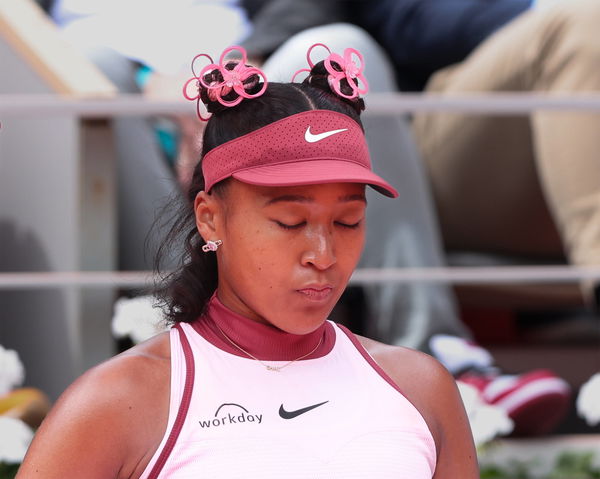
via Imago
Naomi Osaka Tennis – French Open 2025 – Roland Garros – Paris – – France – 26 May 2025. *** Naomi Osaka Tennis French Open 2025 Roland Garros Paris France 26 May 2025 Copyright: xJuergenxHasenkopfx

via Imago
Naomi Osaka Tennis – French Open 2025 – Roland Garros – Paris – – France – 26 May 2025. *** Naomi Osaka Tennis French Open 2025 Roland Garros Paris France 26 May 2025 Copyright: xJuergenxHasenkopfx
Naomi Osaka’s resurgence at Flushing Meadows has been hard to ignore. Under the bright lights of Arthur Ashe, she stepped on court against Daria Kasatkina and played like the champion she once was– dictating rallies, painting the lines, and sealing the opening set without conceding a game. Yet when the match was done and the tension lifted, Osaka didn’t celebrate in the way most expected. Instead of thanking her team, she had an apology to offer.
During the post-match interview after her win over Kasatkina, Osaka said, “It’s been a really long journey, but I’m glad to be here now. Honestly, that wasn’t really in my mind while I was playing. I’m so sorry to my team. I feel like I gave you guys attitude. For sure I was giving the shadiest looks. I’m so sorry. I feel like I turned into a different person when I’m playing. So, sorry you guys. I feel like I was also like screaming a lot.” The reporter then remarked how there had been plenty of “come-ons” during the match. And well, they, too, go on to describe just how difficult winning had been for her here.
Those looks Osaka apologized for came during a stretch where nothing felt easy. She flew through the first set without dropping a game, but the match flipped quickly after that. Kasatkina broke early in the second and went up 4-1, and Osaka’s frustration started to show. Thirteen errors in that set alone told the story. A missed forehand had her standing with hands on her hips, and before long, she was rushing through points, trying to find some rhythm again. So yes, every time she glanced toward her box, it carried that edge. After all, it wasn’t just another match for her.
ADVERTISEMENT
Article continues below this ad
This was Osaka’s first trip to the fourth round of the US Open since 2020, the year she lifted her second trophy in New York. The last time she made the second week of any Slam was the 2021 Australian Open, a title run played in front of empty seats during a snap lockdown. Since then came the breaks: the decision to step away for her mental health, a 16-month hiatus for pregnancy and the birth of her daughter, Shai, and the comeback that she hoped to begin in 2024. She came back at the start of 2024 wanting everything to fall into place quickly, but it didn’t.
ADVERTISEMENT
Article continues below this ad
Twice this season, in Melbourne and at Wimbledon, she had fallen one match short of this stage. So when the second set slipped away on Louis Armstrong, it wasn’t just about Kasatkina’s surge; it was also about putting an end to years of waiting, setbacks, and the fear of seeing it all stall again. Next comes a clash that feels like a sequel to her reinvention chapter: Naomi Osaka versus Coco Gauff.
Six Years Later, Osaka and Gauff Share the Stage Once More
They’ve met five times before, with Gauff holding a 3-2 edge, but each encounter has told a different story. Their last meeting came at the China Open in October 2024, where Osaka had to retire after splitting two sets because of a back injury. And then there was the unforgettable night at Arthur Ashe in 2019. Osaka, then the top seed and defending champion, swept a 15-year-old Gauff 6-3, 6-0 under the lights. Six years on, that teenager is now a U.S. Open champion and the world No. 3, coming off a commanding 6-3, 6-1 win over Magdalena Frech to set up this fourth-round clash.
ADVERTISEMENT
Article continues below this ad
For Osaka, the occasion carries both weight and warmth. “Can somebody come to the match and cheer for me? Because I mean it’s kinda tough playing an American here, but I hope you guys kind of adopted me as well,” she said with a smile in the same post-game conference after beating Kasatkina. “I kinda also see her as a little sister, so it’s really cool to be playing her here again.”
The setting is loaded with significance and contrasts. For Gauff, it’s about building on the promise that made her a champion. For Osaka, it’s about proving that her comeback isn’t just sentimental but also competitive.
What’s your perspective on:
Does Naomi Osaka's emotional honesty make her more relatable, or should she keep her game face on?
Have an interesting take?
ADVERTISEMENT
ADVERTISEMENT
ADVERTISEMENT
ADVERTISEMENT



Does Naomi Osaka's emotional honesty make her more relatable, or should she keep her game face on?